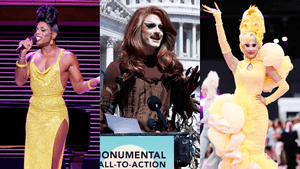The rapidly-approaching presidential election is going to have major ramifications for transgender people — and it's weighing heavily on their minds.
In a year where 1 in 5 trans people lost access to healthcare due to anti-LGBTQ+ laws, 58 percent have considered moving to a different state, according to a new survey from FOLX Health. With the November elections on the horizon, 67 percent are proactively making plans to change their use of gender-affirming care.
9 in 10 respondents said that they believe the presidential election will have a "major impact" on healthcare for LGBTQ+ people, with 65 percent saying it will have a "major impact" in their state. Because of this, over two-thirds are either stockpiling their medications, or delaying or expediting their treatment.
Political discourse has affected the emotional well-being of 86 percent of respondents, led to strained familial relationships among 67 percent, and created fear for the safety of themselves and their loved ones among 67 percent. Over half (58 percent) reported the discourse leading to real-world bullying and harassment, with 58 percent also reporting online abuse related to politics.
92 percent said that the election discourse is causing them to feel anxious, and 2 in 3 are experiencing "frequent mental distress" because of it. The rates of mental distress are particularly alarming, as in 2021, just 33 percent of trans people reported frequent poor mental health days — approximately half of those reporting distress three years later.
Despite the widespread crisis, 55 percent said they were unable to access mental health treatment, with 46 percent saying could not find a provider inclusive of the LGBTQ+ community.
However, mental health concerns have slightly improved since President Joe Biden's decision to drop out of the race, with the respondents reporting lower rates of frustration (86 percent now compared to 95 percent previously), lower rates of uninterest (11 percent vs. 21 percent), and higher rates of enthusiasm (32 percent) and hopefulness (48 percent). Over 1 in 4 (28 percent) believe that Kamala Harris "very much so" addresses the concerns of the LGBTQ+ community.
"As we approach the 2024 election, it is essential to mobilize and empower the LGBTQ+ community to make their voices heard at the poll," the report reads. "By fostering awareness and engagement, we can drive meaningful change and address the needs and concerns of the LGBTQ+ community."


















































































